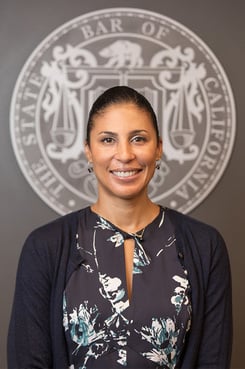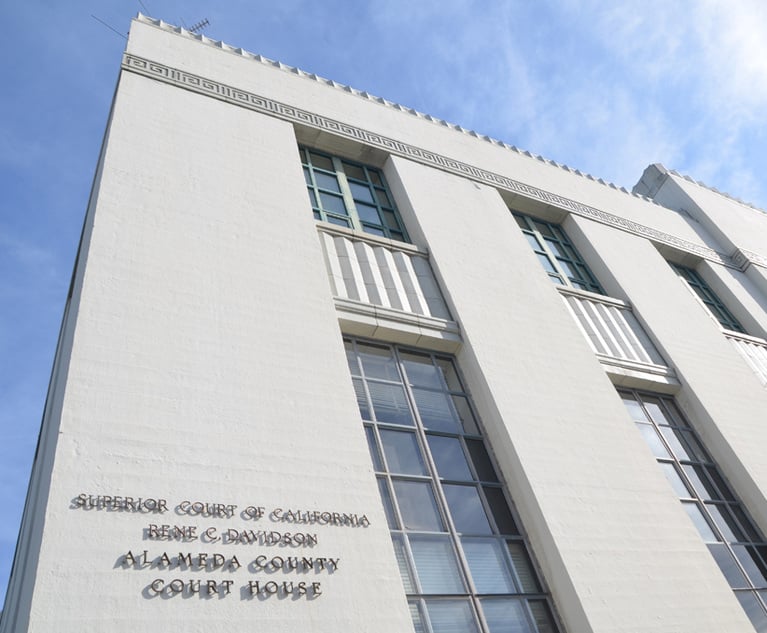Leah Wilson, Resigning as Bar Director, Reflects on Her 2-Year Leadership
"I certainly feel confident that I'm leaving [the bar] in better condition than I found it," Wilson said in an interview with The Recorder.
December 13, 2019 at 04:09 PM
4 minute read
 Leah Wilson, State Bar of California (Photo: Courtesy Photo)
Leah Wilson, State Bar of California (Photo: Courtesy Photo)Leah Wilson, the California state bar's executive director for the last two years, will resign next month to "pursue other career interests," the bar said in a statement Friday.
Wilson, who will step down Jan. 17, she said she will have a "transition contract" to continue work on certain bar initiatives. Donna Hershkowitz, the bar's programs director and a former Judicial Council lobbyist, will serve as interim director.
Wilson said she plans next year to work on a venture mixing public and private dollars with philanthropy. She called her departure "bittersweet" but said the institution of a strategic plan for the agency and a metrics system for measuring successes has put the bar on a strong footing.
"I certainly feel confident that I'm leaving [the bar] in better condition than I found it," Wilson said in an interview with The Recorder.
The bar's board of trustees in November conducted a closed-door performance review of Wilson but did not disclose any results or action in the open session of its meeting. Wilson said Friday the meeting was mostly an opportunity for her to offer her thoughts on a previously completed review and played no role in her decision to leave.
Wilson joined bar leadership in 2015 as chief operating officer with the understanding that she would succeed then-executive director Elizabeth Parker. She had earlier served as executive officer at the Alameda County Superior Court and as a manager at the Judicial Council.
"Leah has been a standout leader of the state bar, and we are sorry to see her go," Alan Steinbrecher, chair of the board of trustees, said in a prepared statement "She has ably led the agency through an unprecedented period of restructuring and reform. We are immensely grateful for all that she has helped the board accomplish, and for her unquestionable talent as an innovative and transformative leader."
Wilson led the bar during a tumultuous period, starting with the agency's split from the professional sections in 2018. The same year brought new pressure from law deans and other bar exam critics as the pass rates for the 2018 tests plummeted to historic lows.
The bar in 2017 named a new chief trial counsel, Steven Moawad, only to withdraw his appointment in 2018 amid opposition in the California Senate. The position has still not been permanently filled, although Wilson said she expects the board of trustees to announce a hire "very soon."
Year-end statistics are expected to show an increase in the bar's backlog of open disciplinary cases, which Wilson credited to the advent of an online complaint system. Complaints are up 15% since the public has been able to file them online, she said.
The state bar made national headlines again this year when an employee accidentally disclosed the topics on the July bar exam days before its administration. Wilson had to recuse herself from the emergency scramble that followed because her son was registered to take the test.
A report on the event issued in November concluded that "some at the state bar have not adapted well" to recently increased oversight by the California Supreme Court.
Wilson also helped shepherd the bar's first licensing fee increase in 20 years through the Legislature this summer. The new revenue is slated to fill a chronic deficit and fund new projects, including technology upgrades.
It's unclear what will happen to many of the policies Wilson championed, from overhauling rules governing the practice of law in California to revamping the bar exam. But Wilson said staff members "all the way up and down the organization" are situated to ensure "that work should continue."
Read more:
Report Reveals Frantic Scramble After California Bar Exam Blunder
See Who Passed California's July 2019 Bar Exam
Slim Majority of Test-Takers Passed California's July Bar Exam
Why the California Bar Director Is Mum on Exam Mayhem
Nearly 7 in 10 Flunked California's February 2019 Bar Exam
How Law Schools Fared on California's February 2019 Bar Exam
This content has been archived. It is available through our partners, LexisNexis® and Bloomberg Law.
To view this content, please continue to their sites.
Not a Lexis Subscriber?
Subscribe Now
Not a Bloomberg Law Subscriber?
Subscribe Now
NOT FOR REPRINT
© 2025 ALM Global, LLC, All Rights Reserved. Request academic re-use from www.copyright.com. All other uses, submit a request to [email protected]. For more information visit Asset & Logo Licensing.
You Might Like
View All

Fresh lawsuit hits Oregon city at the heart of Supreme Court ruling on homeless encampments
4 minute read

Trending Stories
- 1An Eye on ‘De-Risking’: Chewing on Hot Topics in Litigation Funding With Jeffery Lula of GLS Capital
- 2Arguing Class Actions: With Friends Like These...
- 3How Some Elite Law Firms Are Growing Equity Partner Ranks Faster Than Others
- 4Fried Frank Partner Leaves for Paul Hastings to Start Tech Transactions Practice
- 5Stradley Ronon Welcomes Insurance Team From Mintz
Who Got The Work
J. Brugh Lower of Gibbons has entered an appearance for industrial equipment supplier Devco Corporation in a pending trademark infringement lawsuit. The suit, accusing the defendant of selling knock-off Graco products, was filed Dec. 18 in New Jersey District Court by Rivkin Radler on behalf of Graco Inc. and Graco Minnesota. The case, assigned to U.S. District Judge Zahid N. Quraishi, is 3:24-cv-11294, Graco Inc. et al v. Devco Corporation.
Who Got The Work
Rebecca Maller-Stein and Kent A. Yalowitz of Arnold & Porter Kaye Scholer have entered their appearances for Hanaco Venture Capital and its executives, Lior Prosor and David Frankel, in a pending securities lawsuit. The action, filed on Dec. 24 in New York Southern District Court by Zell, Aron & Co. on behalf of Goldeneye Advisors, accuses the defendants of negligently and fraudulently managing the plaintiff's $1 million investment. The case, assigned to U.S. District Judge Vernon S. Broderick, is 1:24-cv-09918, Goldeneye Advisors, LLC v. Hanaco Venture Capital, Ltd. et al.
Who Got The Work
Attorneys from A&O Shearman has stepped in as defense counsel for Toronto-Dominion Bank and other defendants in a pending securities class action. The suit, filed Dec. 11 in New York Southern District Court by Bleichmar Fonti & Auld, accuses the defendants of concealing the bank's 'pervasive' deficiencies in regards to its compliance with the Bank Secrecy Act and the quality of its anti-money laundering controls. The case, assigned to U.S. District Judge Arun Subramanian, is 1:24-cv-09445, Gonzalez v. The Toronto-Dominion Bank et al.
Who Got The Work
Crown Castle International, a Pennsylvania company providing shared communications infrastructure, has turned to Luke D. Wolf of Gordon Rees Scully Mansukhani to fend off a pending breach-of-contract lawsuit. The court action, filed Nov. 25 in Michigan Eastern District Court by Hooper Hathaway PC on behalf of The Town Residences LLC, accuses Crown Castle of failing to transfer approximately $30,000 in utility payments from T-Mobile in breach of a roof-top lease and assignment agreement. The case, assigned to U.S. District Judge Susan K. Declercq, is 2:24-cv-13131, The Town Residences LLC v. T-Mobile US, Inc. et al.
Who Got The Work
Wilfred P. Coronato and Daniel M. Schwartz of McCarter & English have stepped in as defense counsel to Electrolux Home Products Inc. in a pending product liability lawsuit. The court action, filed Nov. 26 in New York Eastern District Court by Poulos Lopiccolo PC and Nagel Rice LLP on behalf of David Stern, alleges that the defendant's refrigerators’ drawers and shelving repeatedly break and fall apart within months after purchase. The case, assigned to U.S. District Judge Joan M. Azrack, is 2:24-cv-08204, Stern v. Electrolux Home Products, Inc.
Featured Firms
Law Offices of Gary Martin Hays & Associates, P.C.
(470) 294-1674
Law Offices of Mark E. Salomone
(857) 444-6468
Smith & Hassler
(713) 739-1250






